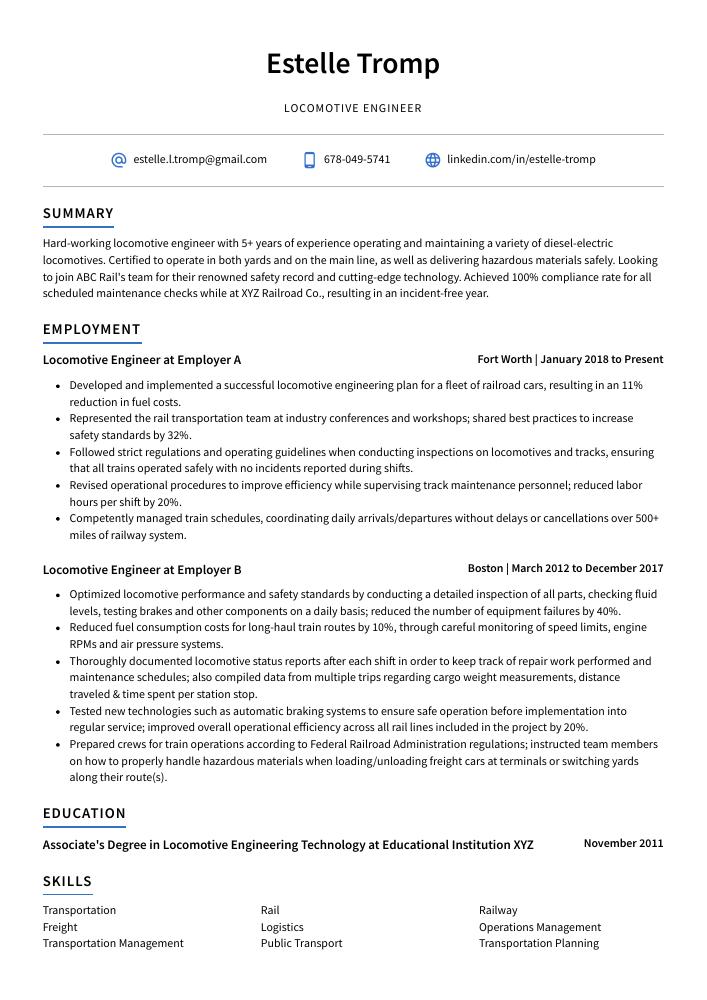Locomotive Engineer Resume Guide
Locomotive engineers operate and control locomotives, ensuring that trains run safely and on time. They inspect the train before departing to ensure proper functioning of all parts, adjust speed as necessary for safety, switch tracks when needed, couple cars together at stations or yards, follow signals from dispatchers regarding track changes or speed restrictions, keep logs of trips taken and report any issues during their shift.
You’ve got the experience and expertise to be a great locomotive engineer, but hiring managers don’t know that. To show them why you’re right for the job, it’s important to write a resume that highlights your qualifications.
This guide will walk you through the entire process of creating a top-notch resume. We first show you a complete example and then break down what each resume section should look like.
Table of Contents
The guide is divided into sections for your convenience. You can read it from beginning to end or use the table of contents below to jump to a specific part.
Locomotive Engineer Resume Sample
Estelle Tromp
Locomotive Engineer
[email protected]
678-049-5741
linkedin.com/in/estelle-tromp
Summary
Hard-working locomotive engineer with 5+ years of experience operating and maintaining a variety of diesel-electric locomotives. Certified to operate in both yards and on the main line, as well as delivering hazardous materials safely. Looking to join ABC Rail’s team for their renowned safety record and cutting-edge technology. Achieved 100% compliance rate for all scheduled maintenance checks while at XYZ Railroad Co., resulting in an incident-free year.
Experience
Locomotive Engineer, Employer A
Fort Worth, Jan 2018 – Present
- Developed and implemented a successful locomotive engineering plan for a fleet of railroad cars, resulting in an 11% reduction in fuel costs.
- Represented the rail transportation team at industry conferences and workshops; shared best practices to increase safety standards by 32%.
- Followed strict regulations and operating guidelines when conducting inspections on locomotives and tracks, ensuring that all trains operated safely with no incidents reported during shifts.
- Revised operational procedures to improve efficiency while supervising track maintenance personnel; reduced labor hours per shift by 20%.
- Competently managed train schedules, coordinating daily arrivals/departures without delays or cancellations over 500+ miles of railway system.
Locomotive Engineer, Employer B
Boston, Mar 2012 – Dec 2017
- Optimized locomotive performance and safety standards by conducting a detailed inspection of all parts, checking fluid levels, testing brakes and other components on a daily basis; reduced the number of equipment failures by 40%.
- Reduced fuel consumption costs for long-haul train routes by 10%, through careful monitoring of speed limits, engine RPMs and air pressure systems.
- Thoroughly documented locomotive status reports after each shift in order to keep track of repair work performed and maintenance schedules; also compiled data from multiple trips regarding cargo weight measurements, distance traveled & time spent per station stop.
- Tested new technologies such as automatic braking systems to ensure safe operation before implementation into regular service; improved overall operational efficiency across all rail lines included in the project by 20%.
- Prepared crews for train operations according to Federal Railroad Administration regulations; instructed team members on how to properly handle hazardous materials when loading/unloading freight cars at terminals or switching yards along their route(s).
Skills
- Transportation
- Rail
- Railway
- Freight
- Logistics
- Operations Management
- Transportation Management
- Public Transport
- Transportation Planning
Education
Associate’s Degree in Locomotive Engineering Technology
Educational Institution XYZ
Nov 2011
Certifications
Certified Locomotive Engineer
National Railroad Safety Board
May 2017
1. Summary / Objective
A resume summary/objective is the first impression you make on a potential employer. As a locomotive engineer, your summary should emphasize your experience with different types of trains and rail systems as well as any certifications or awards you have earned in this field. You could also mention how many years of experience you have working with locomotives, what safety protocols you are familiar with, and any special skills that set you apart from other candidates.
Below are some resume summary examples:
Seasoned locomotive engineer with 10+ years of experience in operating and maintaining locomotives. Committed to ensuring safety while meeting performance targets. Possesses an excellent record of safe operation, consistently praised for smooth starts/stops and efficient route navigation. Expertise includes troubleshooting mechanical issues on the spot, as well as performing preventative maintenance tasks such as oil changes and brake adjustments.
Professional locomotive engineer with 7+ years of experience driving and operating trains. Possesses a comprehensive understanding of all safety regulations, signals and procedures for the safe operation of locomotives. At XYZ Railway, operated 250 freight cars on 5 different routes without incident or accident for 8 months. Collaborated closely with dispatchers to ensure timely delivery of cargo while adhering to strict speed limits.
Diligent locomotive engineer with over 20 years of experience in operating and maintaining trains. Proven record of safely completing tasks within a tight schedule, even under extreme weather conditions. Trained hundreds of engineers on the latest safety protocols and technologies to ensure maximum efficiency. Possess a valid Class 1 locomotive engineer license from ABC Board along with several additional certifications.
Reliable locomotive engineer with 7+ years of experience safely and efficiently operating a variety of locomotives. Seeking to join ABC Rail as the next Locomotive Engineer, bringing strong safety record and excellent troubleshooting skills to ensure safe operations in all weather conditions. Achieved 100% on-time arrival rate for 2 consecutive months during previous role at XYZ Rail.
Detail-oriented locomotive engineer with 7+ years of experience in safely operating high-speed trains. Looking to join ABC Railway as a locomotive engineer and leverage my expertise in the safe operation of passenger trains, equipment inspections, and maintenance operations. Achieved 99% on-time performance for all assigned trips throughout 2020 while ensuring safety at all times.
Talented Locomotive Engineer with 10+ years of experience providing safe and timely transportation services to passengers. Proven track record in managing complex train systems while adhering to strict safety protocols. Seeking a role at ABC Railways where I can make use of my expertise in locomotive operations, maintenance, and repair to further the company’s mission.
Passionate locomotive engineer with over 10 years of experience operating trains and managing crews. Adept at safely delivering freight on time while complying with all regulatory guidelines, including FRA rules. At XYZ Railroad, established a system that reduced the number of late deliveries by 15%. Received two awards for outstanding performance in 2020.
Amicable locomotive engineer with 10+ years of experience operating and maintaining diesel-electric locomotives. Proven track record of safely transporting freight, passengers, and personnel while adhering to rail industry regulations. Seeking to bring expertise in efficient route planning and safety protocols to the role at ABC Rail Systems.
2. Experience / Employment
The work history/experience section should be written in reverse chronological order, with your most recent role listed first.
In this section, you want to use bullet points to explain what you did and the results achieved. This allows for easy reading by the reader so they can quickly get an idea of what you were responsible for.
For example, instead of saying “Operated locomotives,” you could say, “Successfully operated a variety of diesel-electric locomotives on multiple routes across Canada while adhering to all safety regulations.”
To write effective bullet points, begin with a strong verb or adverb. Industry specific verbs to use are:
- Operated
- Monitored
- Inspected
- Troubleshot
- Adjusted
- Tested
- Coordinated
- Scheduled
- Loaded
- Unloaded
- Repaired
- Replaced
- Followed
- Documented
- Trained
Other general verbs you can use are:
- Achieved
- Advised
- Assessed
- Compiled
- Demonstrated
- Developed
- Expedited
- Facilitated
- Formulated
- Improved
- Introduced
- Mentored
- Optimized
- Participated
- Prepared
- Presented
- Reduced
- Reorganized
- Represented
- Revised
- Spearheaded
- Streamlined
- Structured
- Utilized
Below are some example bullet points:
- Demonstrated safe and proficient operation of locomotives while transporting cargo on over 15,000 miles of track annually; successfully delivered freight to destination in a timely manner with zero accidents.
- Loaded up to 8 railcars at a time onto tracks for transport and coordinated the movement of trains according to strict timetables; reduced average loading times by 10%.
- Structured an efficient system for scheduling trips in order to minimize downtime and maximize productivity; increased train efficiency by 28% within one year.
- Actively monitored all gauges, signals & safety equipment during travel while adhering strictly to company regulations and railroad laws; identified potential risks before they became issues 95% of the time.
- Inspected brakes, wheels, couplings & other parts daily prior to departure in order ensure that there were no mechanical faults present or developing problems which could lead to delays or damage cargo/equipment.
- Trained 10+ new locomotive engineers in the safe handling and operation of heavy-duty railcars; reduced on-the-job incidents by 23% over 2 years.
- Compiled daily reports for train operations, including vehicle load weight, cargo information, track conditions and fuel consumption data; improved accuracy by 12%.
- Proficiently operated up to 10 freight trains per day across a 500 km radius while ensuring all safety regulations were strictly adhered to at all times.
- Unloaded an average of 30 cargo containers from each freight train within 1 hour using efficient crane systems and secured them with locking straps as required by protocol.
- Formulated plans for potential railroad route diversions due to maintenance requirements or natural disasters such as floods & snowstorms; minimized delays caused by these events by 25%.
- Repaired 30+ locomotives and rail cars per week, ensuring that all safety standards were met and reducing downtime by 35%.
- Presented technical briefings to train operators on the proper use of controls, braking systems and other equipment; improved driver efficiency by 20% in the last quarter.
- Effectively managed a team of 8 mechanics while coordinating with supervisors regarding scheduling issues; completed maintenance projects 3 days ahead of schedule on average.
- Coordinated over 50 freight shipments between various terminals each month, troubleshooting any mechanical problems encountered along the way & avoiding costly delays or accidents due to malfunctioning parts/equipment.
- Reorganized daily operational plans for 10 crews according to customer needs; decreased travel times by 25%, freeing up additional time for more efficient service delivery throughout my shift.
- Substantially increased locomotive safety and efficiency by diagnosing more than 50 mechanical issues each month, resulting in an average of $2,000 saved annually.
- Documented all inspections, maintenance activities and repair works according to company standards; provided detailed monthly reports on performance metrics that contributed to the steady improvement of operational processes.
- Participated actively in the training and development of 10 new hires who eventually became certified engineers; successfully completed 90-hour qualification program for Class 1 & 2 inspection process certification within 6 months ahead of schedule.
- Scheduled train trips between two or more points with precision accuracy while accounting for factors such as weather conditions, terrain features and trackwork limitations; achieved a 98% punctuality record over a period of 12 months without any delays due to technical errors or mishaps caused by unsafe practices/procedures from crew members under my supervision.
- Utilized state-of-the art technologies including automated brakes systems (ABS) , positive train control (PTC), trip optimization software programs etc., to ensure safe operation at speeds up to 110 mph during long distance runs and/or heavy traffic scenarios involving multiple crossings per day along busy rail lines across different states.
- Streamlined locomotive operations by successfully identifying and implementing ways to reduce fuel consumption, resulting in an average cost savings of $2,500 per month.
- Assessed the condition of locomotives prior to each shift; alerted supervisors when repairs were necessary or safety standards not being met and always kept trains running on time.
- Successfully operated up to 10 freight trains a day over 230 miles of track between two states with 100% accuracy and no delays.
- Spearheaded daily inspections for all engines under my supervision while adhering strictly to federal regulations governing railroads; reduced mechanical failures by 25%.
- Adjusted train speeds according to weather conditions, signaling systems & traffic control orders; minimized derailment risks through careful monitoring of tracks at all times.
- Troubleshot malfunctioning locomotives, identifying and resolving technical issues in a timely manner; reduced downtime of trains by 30%.
- Achieved 95% on-time arrivals across 10+ daily routes while operating diesel, electric or hybrid engines with utmost safety precautions.
- Introduced innovative maintenance strategies which resulted in an increase of 15% efficiency within the department’s budget constraints.
- Diligently monitored operation systems such as brakes, signals and switches along railway tracks to ensure safe transportation for passengers and cargo shipments alike.
- Monitored speed limits using advanced technology equipment to adhere to railroad regulations; recorded over 6 months without any infractions or penalties from governing bodies.
- Expedited delivery of over 200 freight and passenger trains, ensuring on-time arrival at final destinations with a 95% punctuality rate.
- Replaced faulty parts in locomotives to maintain securely running engines; minimized downtime by 20%.
- Operated up to 10 diesel or electric powered locomotives daily; safely transported an average of 3,000 passengers per week between stations without any incidents reported.
- Facilitated the movement of goods and services across long distances while adhering strictly to all safety protocols within established industry standards; awarded Employee Recognition Award for exceptional performance four times in two years as Locomotive Engineer.
- Independently inspected cab signals, brakes & air systems prior to each shift start, using visual inspections techniques and measuring devices such as gauges & calipers for accuracy checks; improved train maintenance efficiency by 15%.
- Advised and monitored up to 10 trainees daily on locomotive operations, safety protocols and maintenance procedures; improved overall quality of training by 20%.
- Efficiently operated multiple types of freight engine systems for transporting goods over long-distance routes with no delays or accidents reported.
- Mentored more than 8 new engineers in the proper use of signaling equipment and emergency brakes, ensuring that all safety standards were met at all times.
- Improved operational efficiency through the utilization of cutting edge technologies; increased total cargo transport capacity per day by 15%.
3. Skills
The skillset employers require in an employee will likely vary, either slightly or significantly; skimming through their job adverts is the best way to determine what each is looking for. One organization may be looking for an engineer with experience in diesel locomotives, whereas another may require someone to have knowledge of electric engines.
It is important to tailor the skills section of your resume accordingly because many employers now use applicant tracking systems that scan resumes for certain keywords before passing them on to a human.
Once listed here, you can further elaborate on your abilities by discussing it in more detail elsewhere; such as the summary or experience section.
Below is a list of common skills & terms:
- Container
- Contract Management
- Contract Negotiation
- Freight
- Light Rail
- Logistics
- Logistics Management
- Operations Management
- Process Improvement
- Project Planning
- Public Transport
- Rail
- Rail Operations
- Rail Safety
- Rail Transport
- Railway
- Railway Signalling
- Railway Systems
- Rolling Stock
- Shipping
- Signalling
- Supervisory Skills
- Team Leadership
- Transportation
- Transportation Management
- Transportation Planning
- Troubleshooting
4. Education
Mentioning an education section on your resume will depend on how far along you are in your career. If you just graduated and have no prior experience, include an education section below your resume objective. However, if you already have years of experience as a locomotive engineer or any other related field, omitting the education section is perfectly fine.
If an education section is included, try to mention courses and subjects relevant to the locomotive engineer role that demonstrate why you are qualified for this job.
Associate’s Degree in Locomotive Engineering Technology
Educational Institution XYZ
Nov 2011
5. Certifications
Certifications are a great way to demonstrate your expertise in a certain field. They show that you have been tested and certified by an authoritative body, which is something employers value highly when considering applicants for their positions.
Include any certifications relevant to the job you are applying for on your resume as it will help set you apart from other candidates who may not be officially certified in those areas. This could make all the difference when it comes to getting hired!
Certified Locomotive Engineer
National Railroad Safety Board
May 2017
6. Contact Info
Your name should be the first thing a reader sees when viewing your resume, so ensure its positioning is prominent. Your phone number should be written in the most commonly used format in your country/city/state, and your email address should be professional.
You can also choose to include a link to your LinkedIn profile, personal website, or other online platforms relevant to your industry.
Finally, name your resume file appropriately to help hiring managers; for Estelle Tromp, this would be Estelle-Tromp-resume.pdf or Estelle-Tromp-resume.docx.
7. Cover Letter
Including a cover letter with your job application is an important step in the hiring process. It’s a great opportunity to introduce yourself, explain why you’re applying for the role and showcase any skills or experience that make you stand out from the crowd.
Cover letters are typically made up of 2 to 4 paragraphs and should include additional information about who you are as a professional. Unlike resumes, they allow recruiters to get a better understanding of what makes you unique and how well suited you would be for their organization.
Below is an example cover letter:
Dear Myrtice,
I am writing to express my interest in the Locomotive Engineer position with your company. I am confident that my experience and skills will make me an asset to your team.
I have four years of experience working as a locomotive engineer. In this role, I was responsible for operating diesel-electric locomotives to transport freight or passengers on assigned routes. My duties included inspecting the locomotive before departure, checking track conditions, coupling and uncoupling cars, and monitoring speed and braking systems during the journey. I also kept logs of mileage, fuel consumption, and any problems encountered during the trip.
In addition to my hands-on experience, I have completed training courses in railway safety procedures and emergency response protocols. My strong attention to detail ensures that all safety procedures are followed correctly while my excellent problem-solving skills enable me to quickly resolve any issues that may arise during a journey.
I would welcome the opportunity to put my skills and experience to work for your company as a Locomotive Engineer. Thank you for your time and consideration; I look forward to speaking with you soon about this exciting opportunity.
Sincerely,
Estelle
Locomotive Engineer Resume Templates
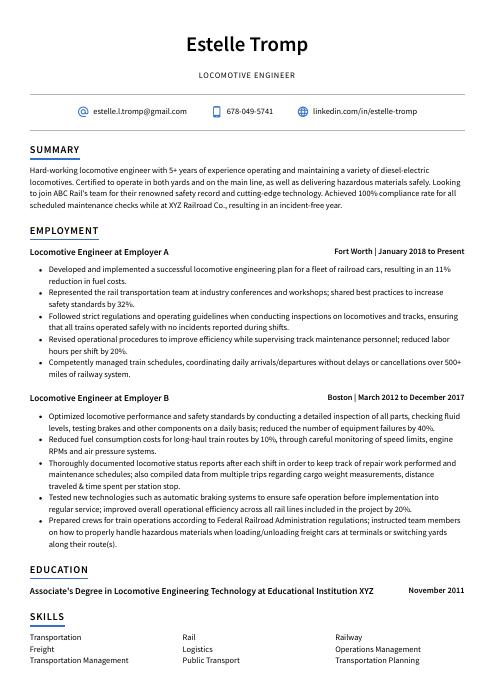 Axolotl
Axolotl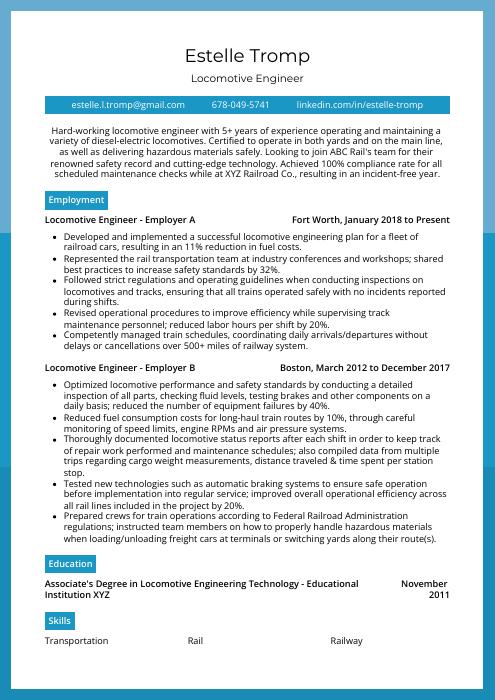 Rhea
Rhea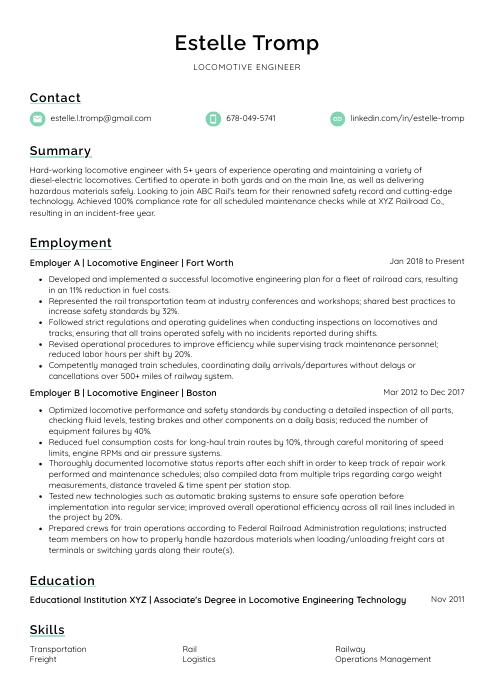 Lorikeet
Lorikeet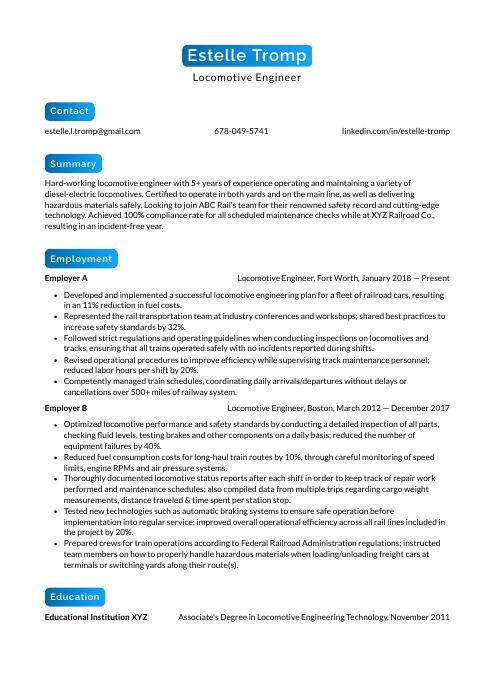 Kinkajou
Kinkajou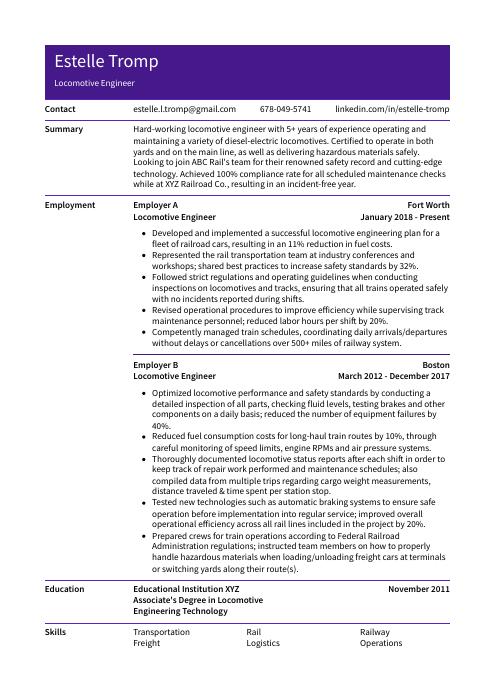 Pika
Pika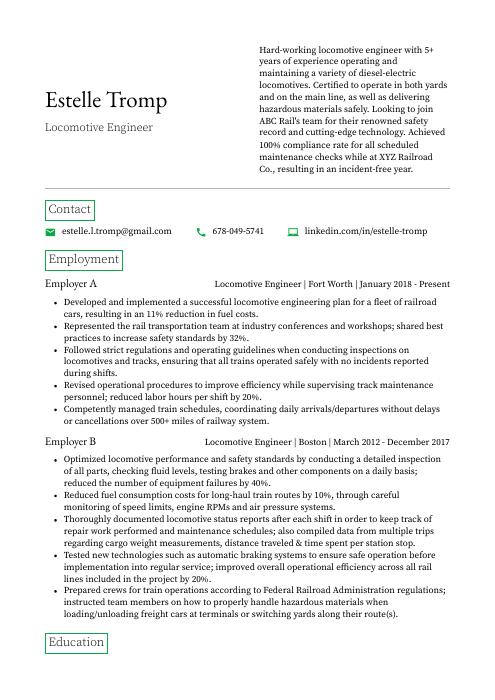 Quokka
Quokka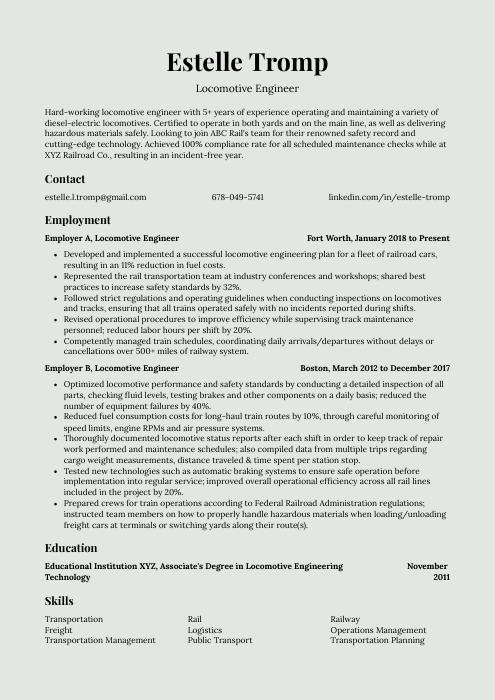 Saola
Saola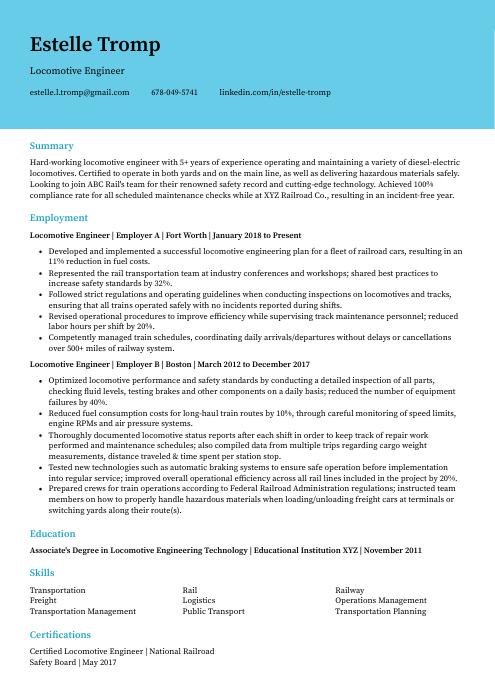 Dugong
Dugong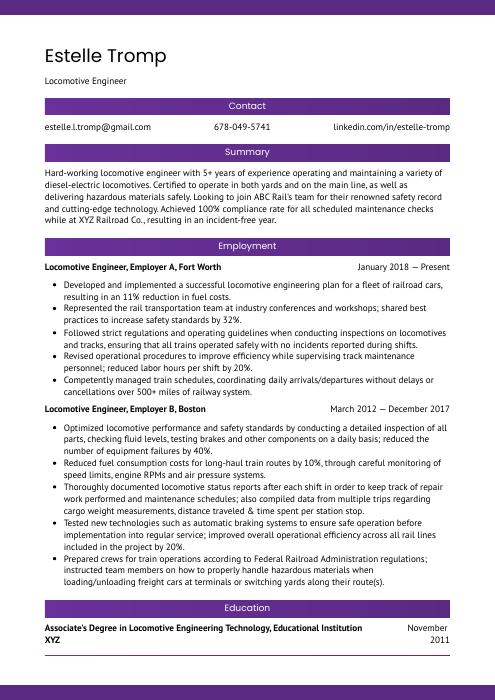 Jerboa
Jerboa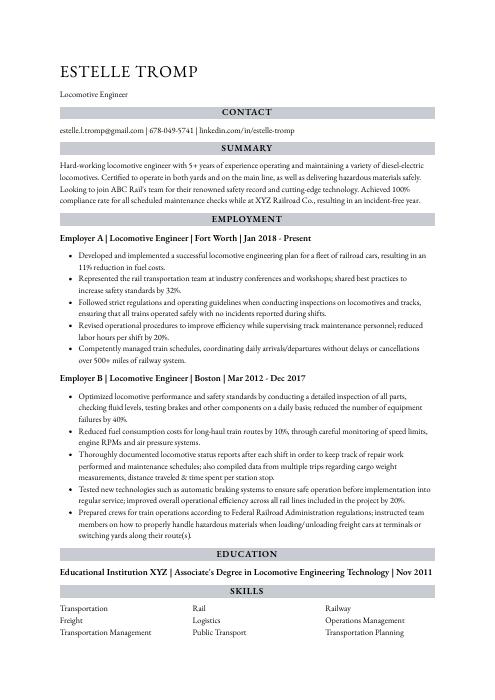 Numbat
Numbat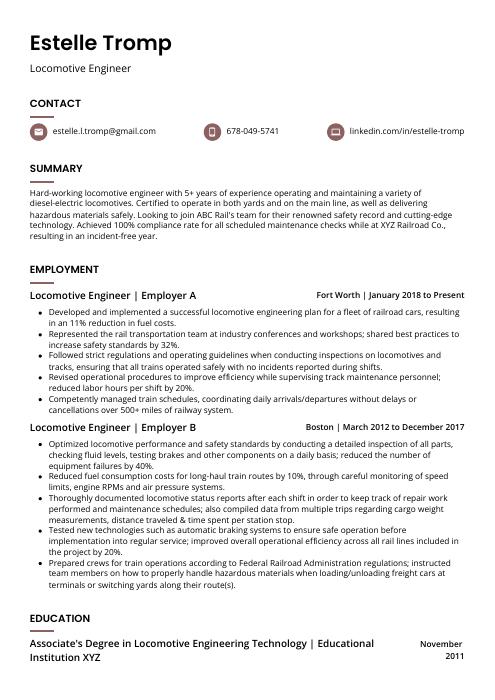 Fossa
Fossa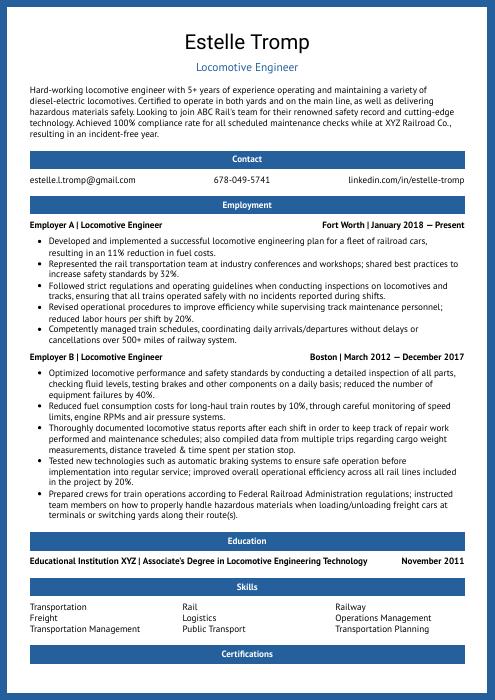 Ocelot
Ocelot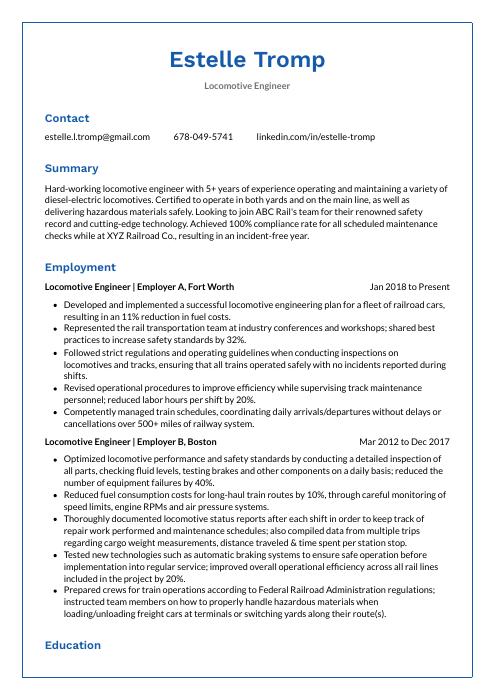 Markhor
Markhor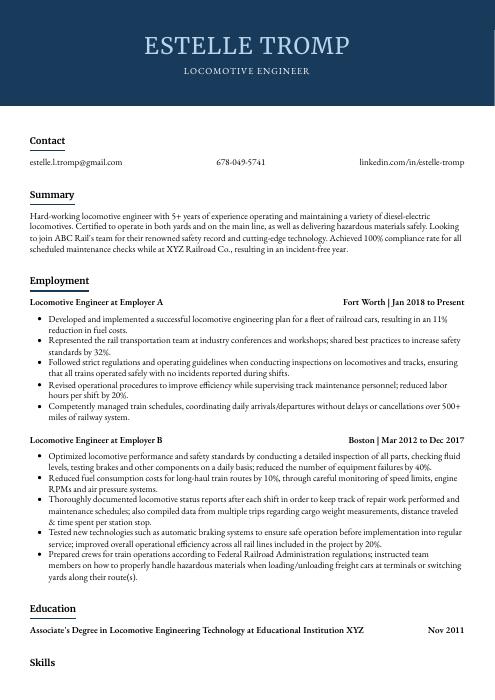 Bonobo
Bonobo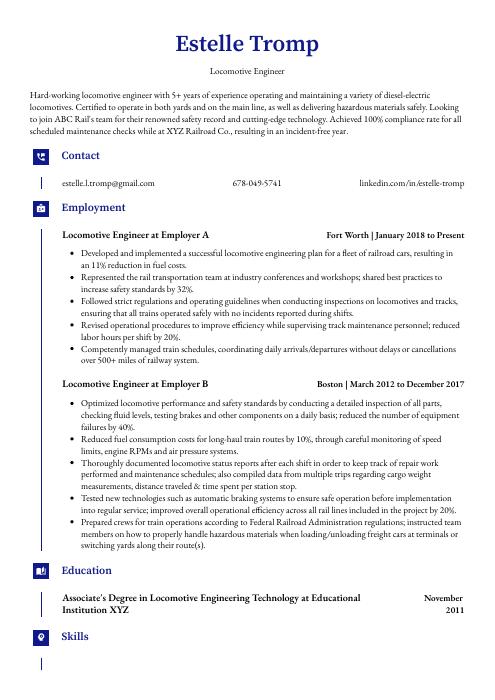 Gharial
Gharial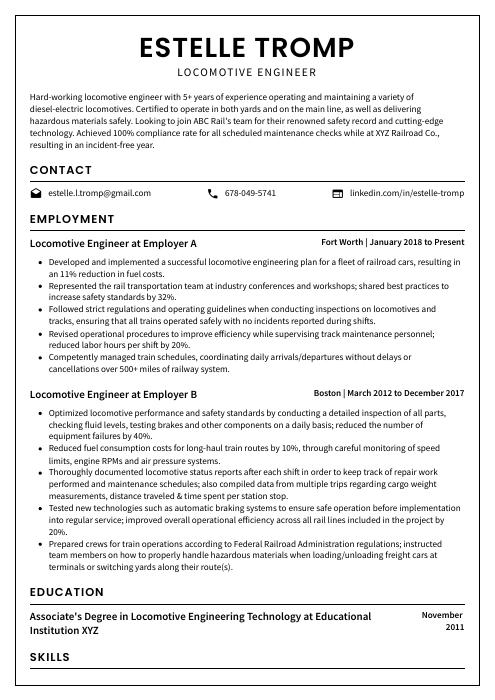 Cormorant
Cormorant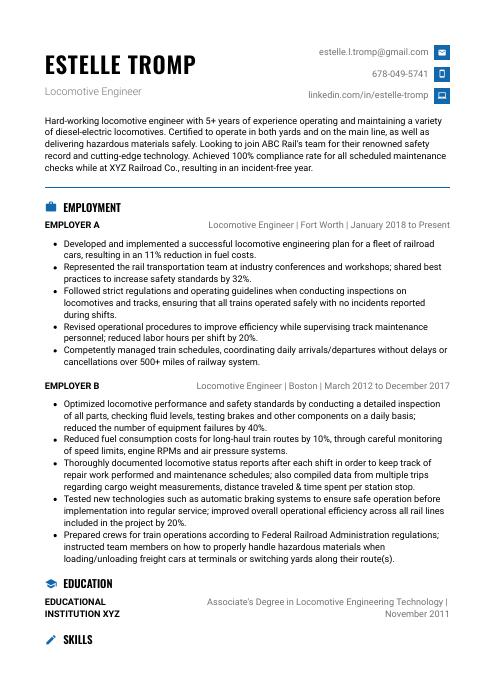 Echidna
Echidna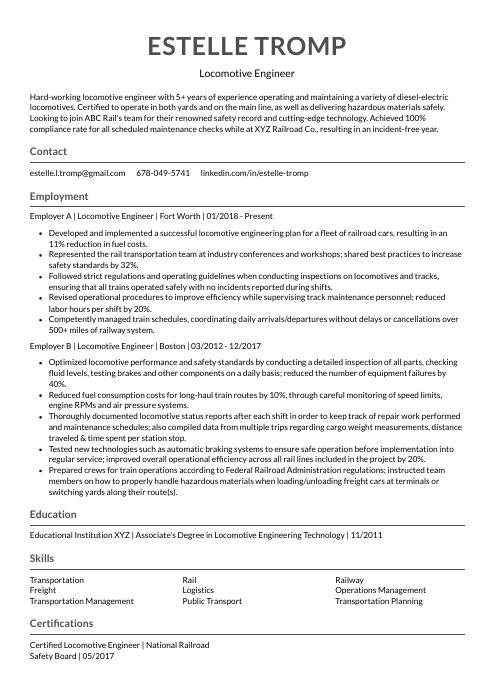 Indri
Indri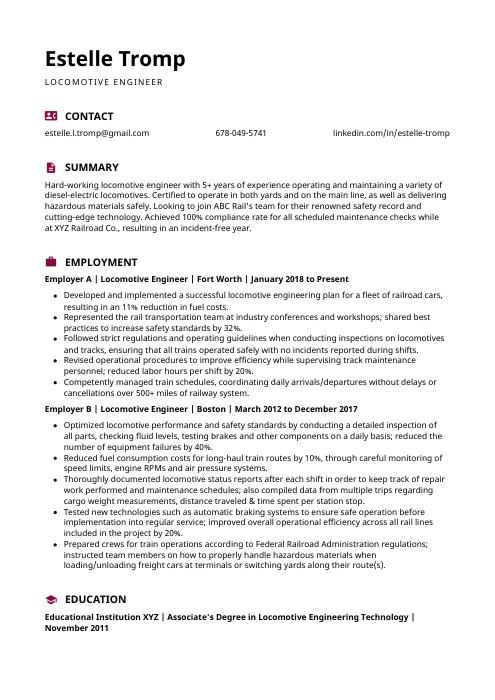 Hoopoe
Hoopoe Rezjumei
Rezjumei
